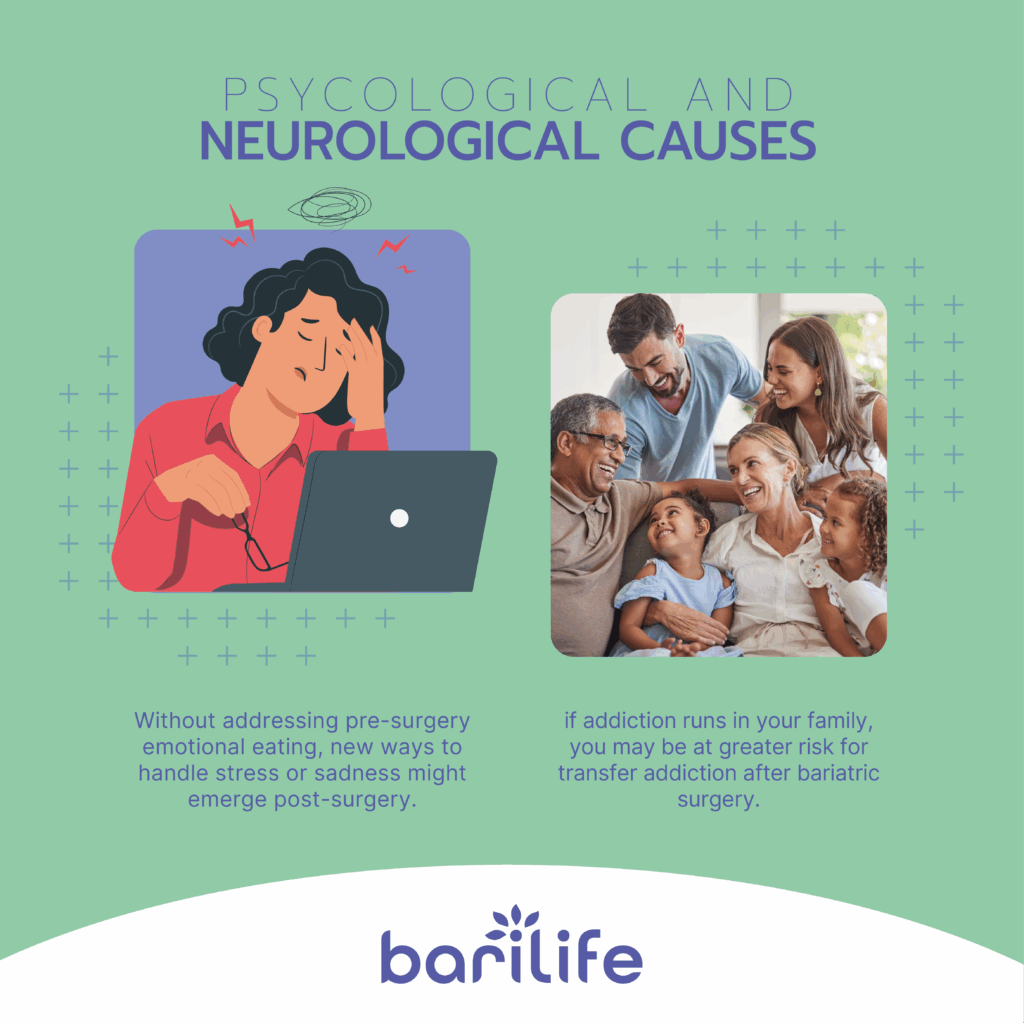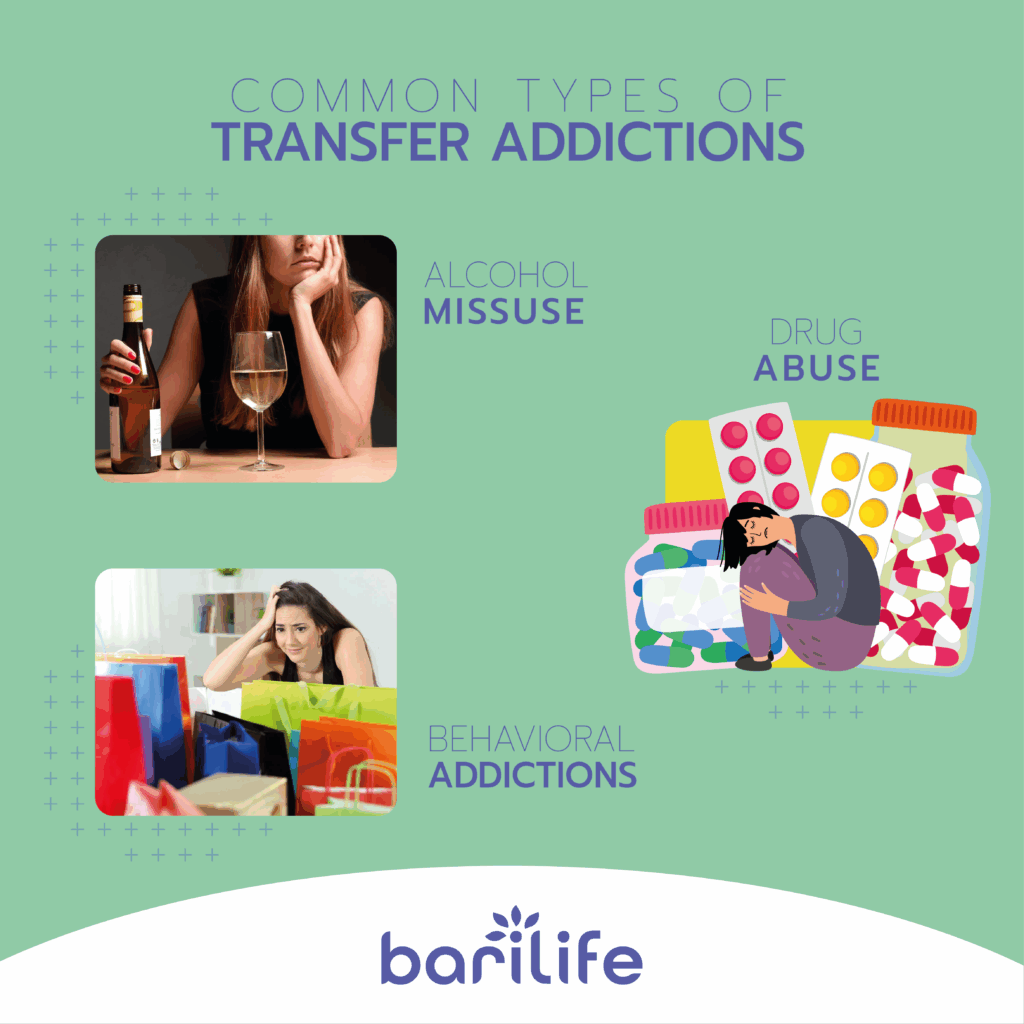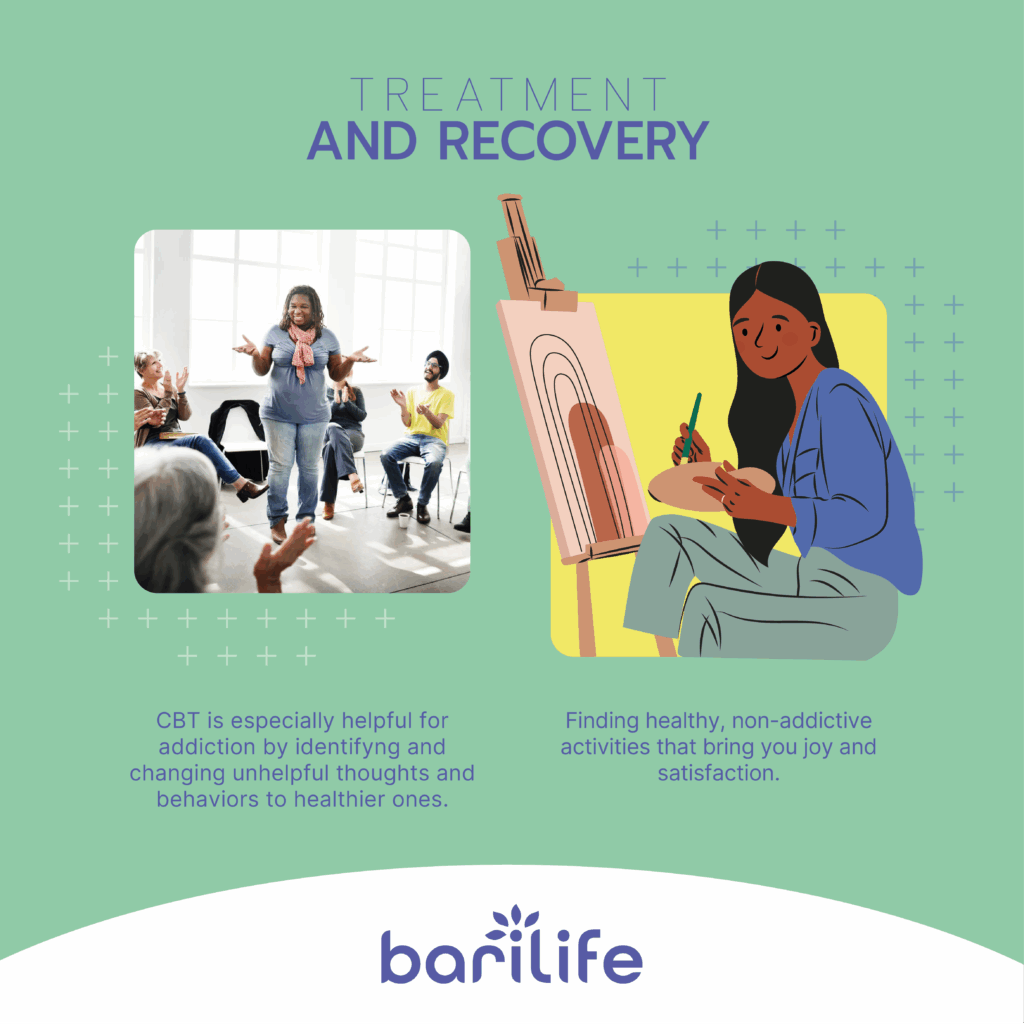Key Takeaways
- Transfer addiction occurs when someone substitutes food addiction with another compulsive behavior after weight loss surgery.
- Common replacement addictions include alcohol, shopping, gambling, and exercise after bariatric surgery, which can develop due to changes in brain chemistry and emotional coping needs.
- Knowing the risk factors and warning signs helps you prevent or address transfer addiction early through proper support and healthy coping strategies.
When you undergo bariatric surgery, you’re making a life-changing decision that affects not just your body but also your mind. While the physical changes are often discussed, the psychological adjustments in life after bariatric surgery sometimes receive less attention. One important issue that deserves more discussion is transfer addiction after bariatric surgery.
Transfer addiction (also called addiction transfer or cross-addiction) happens when someone who previously used food as a way to cope with emotions begins to use something else instead after weight loss surgery.
This article helps you understand what causes it, recognize warning signs, and learn strategies to prevent or address transfer addiction that bariatric surgery patients sometimes experience.
Table of Contents
Psychological and Neurological Causes

The brain’s reward system plays a major role in transfer addiction. When you eat certain foods, especially those high in sugar or fat, your brain releases dopamine—a chemical that makes you feel good. After bariatric surgery, you can’t eat the same quantities of food, which means you no longer get the same dopamine reward from eating.
This change in your brain’s reward system can lead you to seek that same pleasurable feeling from other sources. It’s essentially looking for a new way to get that dopamine rush it was used to getting from food.
Many people used food as a way to cope with difficult emotions before surgery. If these emotional issues aren’t addressed, you might find yourself looking for new ways to deal with stress, sadness, or anxiety after surgery. Without healthier coping mechanisms in place, this search can lead to new addictive behaviors, including unhealthy relationships or compulsive behaviors related to sex after bariatric surgery.
Some people are genetically more prone to addiction than others. If addiction runs in your family, you may be at greater risk for transfer addiction after bariatric surgery. Certain variations in genes connected to dopamine receptors can make some individuals more susceptible to both food and other types of addiction.
Common Types of Transfer Addictions
Alcohol misuse is one of the most common transfer addictions after weight loss surgery. This is particularly concerning because bariatric surgery changes how your body processes alcohol. After surgery, alcohol enters your bloodstream more quickly and takes longer to leave your system, making it easier to become intoxicated in smaller amounts.
Some people turn to drugs as a substitute for food after surgery. This might start with prescription medications that were needed initially for post-surgical pain, but can develop into misuse of these or other substances.
Behavioral addictions are also common forms of addiction transfer after bariatric surgery. These might include:

- Shopping addiction or compulsive spending
- Gambling
- Gaming or internet addiction
- Exercise addiction
- Sex or relationship addiction
These behaviors activate similar reward pathways in the brain as food once did, which explains why they can become replacement addictions.
Risk Factors for Developing Transfer Addiction
Several factors may put you at higher risk for transfer addiction.
Previous History of Substance Misuse
A history of substance misuse or addiction significantly increases your risk of developing transfer addiction. If you’ve struggled with addiction in the past—whether to alcohol, drugs, or other behaviors—you may be more vulnerable after surgery.
Mental Health Disorder
Mental health issues like depression, anxiety, and bipolar disorder can increase your risk for transfer addiction. They often coexist with food addiction and can make you more likely to seek out new ways to self-medicate after surgery.
Lack of Support System
Limited support systems can leave you vulnerable to transfer addiction. Without people to talk to about your struggles or help you through difficult times, you might be more likely to turn to substances or behaviors that temporarily make you feel better.
Difficulty Expressing Emotions
Some people find it hard to identify and express their emotions. If you struggle to recognize and talk about your feelings, you might be more likely to deal with them through addictive behaviors rather than healthier means.
Additionally, factors such as returning to smoking after bariatric surgery or engaging too early in powerlifting after bariatric surgery without proper medical supervision may indicate attempts to fill emotional voids, potentially leading to addictive behaviors.
Warning Signs and Symptoms
Pay attention if you notice yourself engaging in a new behavior or using a substance compulsively. If you feel you can’t stop or cut back despite wanting to, this could be a sign of addiction transfer after bariatric surgery.
Watch for signs that your new behavior is taking priority over other responsibilities. Are you missing work, neglecting family obligations, or letting personal care slide because of drinking, shopping, or other behaviors? This shift in priorities is an important warning sign.

Many people with developing addictions become secretive about their behavior. You might find yourself hiding purchases, lying about where you’ve been, or drinking alone. If you’re being dishonest about your activities or spending, it’s worth examining why.
Noticeable mood changes when you can’t engage in the behavior can also signal a problem. Feeling irritable, anxious, or depressed when you can’t shop, drink, or gamble might indicate that you’re developing a dependency.
Prevention Strategies
Here are several strategies that may help you avoid transfer addiction.
Get Professional Help
Getting psychological support before surgery can help identify potential issues and develop strategies to prevent transfer addiction. Be honest with your healthcare team about any history of addiction or mental health challenges, as this can help them create a prevention plan for you.
Adapt Healthy Coping Strategies
Learning to adapt healthier ways to deal with stress and emotions helps avoid transfer addiction. You can use techniques like mindfulness meditation, deep breathing exercises, or journaling to help with emotional regulation instead of engaging in addictive behaviors.
For example, structured toning exercises after bariatric surgery and guidance on how to sleep after bariatric surgery are helpful for recovery, both physically and emotionally. These habits promote long-term success while reducing reliance on maladaptive coping behaviors.
Build a Support System
Building a strong support network of friends, family, and support groups can also provide emotional backing during these challenging times. When you have people with whom you can open up about your struggles, it reduces the temptation to cope with unhealthy means.
Set Clear and Measurable Goals
Setting clear, achievable goals for your post-surgery life beyond just weight loss gives you positive things to focus on. Whether it’s career advancement, learning new skills, or improving relationships, having meaningful goals helps fill the void that food might have previously occupied. This might include learning how to build muscle after bariatric surgery in a healthy, sustainable way.
Treatment and Recovery
If you notice signs of transfer addiction, seeking professional help early is crucial. Addiction specialists understand the unique challenges of bariatric patients and can provide appropriate treatment. Support groups specifically for people who have had weight loss surgery can also provide understanding and guidance.

Cognitive-behavioral therapy (CBT) is especially useful for addressing addictions. This type of therapy lets you identify unhelpful thought patterns and behaviors and substitute them with healthier alternatives. It addresses the underlying issues that drive addictive behaviors.
Tracking your behaviors, emotions, and triggers in a journal can help you better understand your addiction patterns. This awareness is an important step in recovery, as it helps you recognize when you’re vulnerable and what situations you might need to avoid or approach differently.
Finding healthy, non-addictive activities that bring you joy and satisfaction. Develop new hobbies, volunteer, or pursue creative interests so you can have positive experiences that don’t rely on addictive substances or behaviors.
Long-Term Success After Bariatric Surgery
Sustainable success after weight loss surgery requires more than just maintaining the weight. It requires a comprehensive approach to health that includes healthy eating habits, regular physical activity, and emotional well-being.
Regular follow-up with your doctor is vital for long-term success. These check-ins allow professionals to monitor not just your physical health but also signs of potential transfer addiction or other psychological challenges.
Many people find that ongoing psychological support is valuable long after surgery. Whether through solo therapy, support groups, or online communities, continuing to address the emotional aspects of your weight loss journey can help prevent or manage transfer addiction.
Conclusion
Bariatric surgery transfer addiction is a legitimate concern that deserves attention and understanding. By recognizing that weight loss surgery affects both your body and mind, you can be better prepared to navigate the emotional challenges that might arise afterward.
Remember that seeking help for transfer addiction isn’t a sign of failure—it’s a courageous step toward complete health and well-being.
With awareness, proper support, and healthy coping strategies, you get to enjoy the benefits of bariatric surgery without falling into new addictive patterns. Your journey to better health encompasses both physical and emotional aspects, and addressing both gives you the best chance for long-term success and happiness.

How Bari Life Can Help
Nutritional balance plays a vital role in maintaining physical and emotional stability after bariatric surgery. Bari Life‘s specialized supplements are made to support your complete well-being during this transformative journey.
Whether you’re searching for bariatric multivitamins that cover all your bases, bariatric protein shakes to help you meet your daily protein goals, or bariatric vitamins chewable for easier absorption, Bari Life offers a wide range of options tailored to your needs.
Our offerings include bariatric snacks and bariatric protein bars to keep you energized throughout the day without compromising your post-surgery nutrition plan. If you require additional support, our bariatric calcium chews are an excellent way to maintain bone health, and we also provide a bariatric multivitamin with iron to help prevent deficiencies.
For those who prefer alternative forms, Bari Life also offers a liquid bariatric vitamin option to ensure optimal absorption and ease of use. Additionally, we understand how important gut health is in your recovery, which is why we provide a carefully formulated bariatric probiotic.
Many patients also experience hair thinning during the recovery period, which is why we recommend our targeted bariatric vitamins for hair loss—specifically created to promote hair strength and regrowth.
Support your complete recovery—both physical and emotional—with nutrition designed for your unique needs. Visit Bari Life today to learn how our specialized bariatric vitamins and supplements can help you achieve lasting success while reducing your risk of addiction after bariatric surgery.
Resources
Learn to Manage Stress. (2024). MedlinePlus.
Transfer Addiction Following Bariatric Surgery. (2016). OAC.



What are your tips and tricks to post-bariatric success?